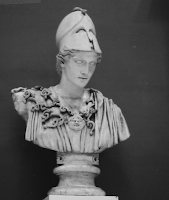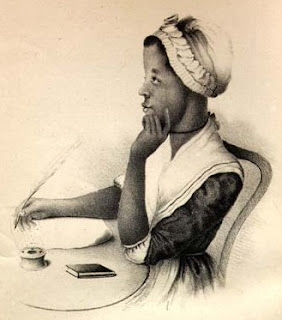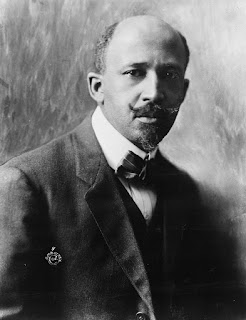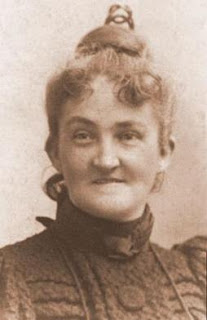 |
| Bust of Aspasia. We have a few copies likely made from an original placed on the Acropolis as a dedication. |
Every time I see someone post, publish, podcast, or whatever about Aspasia of Miletus, I have a moment of false hope that they will be doing so based on scholarship on Aspasia published in the last few decades and not based on fantasies of her as some high-class Grande Horizontale. Aspasia the hetaira is a long-standing trope that resists evidence to the contrary even though such a trope was disputed even as far back as the 1920s and in some cases, even in the 19th century. It is based on the application of a multivalent term hetaira to a woman whose prevalence in our male-dominated sources from ancient Athens makes her stand out (even though the terms was not applied to her in ancient sources). I was going to write something up for the great site Bad Ancient on this, but I've already written on it a lot, so, I am placing here a summary of the problem, links to further readings, and an excerpt from my book.
Part of the insistence on "Aspasia the hetaira" is rooted in a misunderstanding of that term itself. Hetaira, as the new Cambridge Greek Lexicon gets right, has a wide range of meanings from the address one woman uses for another who happens to be her friend (Sappho speaks of Hera and Artemis as "girlfriends" in this sense) to a woman who is in a sexual relationship with a man, but is not married to them (what we in the modern world might also call a "girlfriend"). Some of these "girlfriends" may have received payments in gifts or support from the men they were with. In a specific mental landscape, this gets translated as "whore".
Another part of this insistence is because we have accepted as real a trope of the wife/whore as the primary structuring device for women in pretty much every society. And, we have come to assume that Aspasia was not Perikles' wife, so she must have been a "whore". And yet, this notion is rooted in an assumption that the Citizenship Law of 451 BCE banned marriage between citizen men and non-citizen women. Scholarly consensus, however, is coalescing around evidence that marriage was not, in fact, banned, until the 380s BCE. And yet, even with this assumption of a 451 BCE marriage ban, many scholars acknowledge that Aspasia was more likely a pallake (also spelled pallakis) in relation to Perikles instead of his "girlfriend" (hetaira).
But what is a pallake? It is most often translated a "concubine", but it really only has something resembling that meaning in a handful of references in Herodotus to women of the Persian King's court. Or, it gets conflated with the use of the term to refer to temple attendants (who themselves get yoked to a disputed concept of the "temple prostitute") or it gets conflated with enslaved women who worked as personal servants in Athenian households, women who are threatened by their enslavers, we are told, with being sent to brothels. Any enslaved woman could be sent to work in a brothel, whether she was the pallake of an owner or a farm hand or wetnurse. More importantly, however, is that the term pallake is also used in Athenian law to refer to a domestic partner who is free and eligible to bear legitimate children to their partner. If Aspasia was not a wife, she was, as Madeline Henry argued in the 1990s, this sort of pallake.
And yet, Aspasia is accused in numerous comic fragments of either being a sex worker or a madam. And Plutarch took this seriously. Except that we know for a fact that the easiest way to attack a politician in Athens was always through their mothers, sisters, daughters, and wives. It's hard to take the anti-Athenian writer Ephorus or the comic poets Cratinus and Aristophanes at face value when they call Perikles' non-citizen wife a madam, when the attack would have been a normal part of political discourse AND expected within anti-immigrant, misogynist comic norms.
We also, of course, have to contend with the Socratic tradition that positions Aspasia as a teacher of rhetoric, likely of young women, but also of young men (see discussion in ch 5 of Immigrant Women).
Anyway, point is, Aspasia was most likely NOT any form of sex worker or madam, but there are a lot of people invested in this specific version of her and resist any evidence to the contrary. I collated all the evidence in my 2014 book Immigrant Women in Athens and discussed the disputed concept of the hetaira again in my 2015 article on two women named Elpinike (sister of Kimon) and Koisyra (mother of Megakles). You can read the whole section on Aspasia in the book (it's chapter 3; ch 1 is an overview of the laws, ch 2 on tragic representations of foreign women, ch 4-5 moves to the 4th c and oratory and further inscriptional evidence for non-citizen women's lives but includes a section on Aspasia as teacher of rhetoric)). Please feel free to read both the book and the article for further contextualization and evidence for why I and other scholars dispute that Aspasia was a madam or hetaira (in the sense of a sex worker) and what is at stake in continuing to promote that version of her.
Below, I am reproducing an excerpt from that study that attempts to reconstruct a more likely version of her life based on a broad range of evidence that includes inscriptions that may refer to her male family members and within the context of how immigrants, especially from Miletus, integrated into Athens in the 5th century BCE. Please consider referring to it next time you see some new encyclopedia entry or textbook that tells you Aspasia was a hetaira because her name means "sweetie" or some bullpuckey like that (citizen women in Athens often had names that meant "honey", "sweetie", etc). Aspasia was a wealthy metic (resident non-citizen) woman in Athens with connections to wealthy citizen families. That context matters.
***
 |
| If Aspasia's tomb remained, it probably looked a lot like this. |
Reconstruction: When Aspasia arrived in Athens sometime around 450 BCE, she did not come as a poor immigrant looking for work in the bustling imperial city that was Athens at that time or as a trained courtesan. Rather, she came to Athens from the politically unstable Miletos as the sister-in-law of the fabulously wealthy and well-known Athenian Alkibiades the elder, just returned from his ostracism. When Alkibiades left Athens in 460 BCE and arrived in Miletos, where he seems to have spent his exile, his marriage to a daughter of the wealthy Milesian Axiochus was nothing outside of the norm for an aristocratic Athenian man. His two children from this union, Axiochus and Aspasios, while metroxenoi, were still reckoned as Athenian citizens because they were born before 451 BCE. When Alkibiades returned to Athens, however, with his Milesian wife and her younger sister Aspasia, the laws had changed thanks to Perikles. What had been possible for Aspasia’s sister, producing citizen children, was no longer a possibility for the young Aspasia.
Thus, when Aspasia arrived in Athens, she came allied by marriage to one of the most powerful families in the city, but would perhaps not be able to contract such a dynastic marriage for herself if only because her children could not be citizens. Still, she was not without citizen friends and family in the city and her immediate social circle was from the cream of Athenian society. The possibilities for finding a good marriage were not out of bounds for her. It is even possible that when Kleinias, the son of the elder Alkibiades from an earlier marriage, died at Koroneia in 447/446 BCE and Perikles became guardian of the younger Alkibiades (III), that Perikles also became the kurios of the still young Aspasia. Around this time, Aspasia and Perikles began a long-term relationship that was recognized as a marriage that lasted until Pericles’ death in 429 BCE. They had one child born sometime before 441 BCE who was enfranchised in 430 BCE. Their relationship, because of Perikles’ prominence and because of the law he himself proposed (and which made his child by Aspasia initially a non-citizen), became the subject of much gossip on the comic stage for certain, and likely, in the agora and the assembly.
Upon Perikles’ death in 429/8 BCE, it is unclear what happened to Aspasia and her son Perikles Jr., although it is possible that the latter became the ward of Alkibiades, now aged around 23, or his own uncle Axiochus, Aspasia’s nephew. Aspasia, Alkibiades’ aunt now aged around 40, would have either become the dependent of Axiochus or of Alkibiades himself until her son came of age. The tradition that Aspasia was remarried to Lysikles, by whom she supposedly had a child named Poristes, is neither secure or necessary. Many of the comic slanders against Aspasia come from the years after Perikles’ death and may be associated with the careers of her nephew and son. Her relationship to Lysikles could have been one of teacher and student because many of the philosophical texts (Plato, Xenophon and Aeschines) treat Aspasia as something akin to a Sophist. It is quite possible that Aspasia and Lysikles were not married at all and never had a child, but by learning rhetoric from her, he was able to bamboozle others as the comic figure Strepseides attempts to do in Aristophanes’ Clouds, thus bearing the metaphorical child, Poristes, a polite way of calling someone a thief. Aspasia also could have offered basic education to young women, thus the reference to her ‘girls’ in Aristophanes’ Acharnians, the pornê whose kidnapping he jokes led to the Megarian decree. We might view both as comic slanders against Aspasia as Sophist, dressed erotically in the guise of madam or prostitute.
This reconstruction of Aspasia’s journey to Athens and her life is based primarily on the epigraphical and historical evidence linking her Milesian family to the Athenian family of Alcibiades (II). Whether it is completely accurate or not does not matter, although I think it a more accurate picture of Aspasia’s life than what is traditionally posited. What matters most, however, is its plausibility and what that means for understanding the possibilities for metic women found frequenting citizen social circles in mid-fifth century BCE in Athens and the impact laws like the Citizenship Law might have had on them. Aspasia has long been reckoned among scholars, especially among scholars studying women’s history, as a courtesan and madam mostly because she was associated socially with Athenian citizen men and scholars have long rejected any notion that a respectable citizen woman could socialize with men in this way.
Aspasia was also considered by her contemporaries as educated and intellectual. The combination of her foreign birth, education and eroticization has led to the inevitable conclusion that she must have been a courtesan because within the dynamics that have become established in the study of Athenian women, the only possible way to understand the famous foreign women of wealth we encounter in the historical record is as such. But it is unclear if such prostitutes really did exist in Aspasia’s lifetime. And the history reconstructed for Aspasia by Bicknell suggests a very different path for metic women of wealth in Athens, especially for those with ties to citizens. While the Citizenship Law did eliminate temporarily and technically the possibility that a metic woman’s child could be a citizen, it did not eliminate relationships for those with connections to the Athenian elites nor did it reduce these women to indigence with no options but to prostitute themselves (or others) to survive. What we see at work both in the invectives against Aspasia and in the scholarly tradition is the ideology of the metic woman, especially reflected in the representation of Phaedra. Aspasia, living in Athens on the cusp of a change in Athenian self-definition, bears the scars of the ideological warfare waged after 451 BCE on metic women under the guise of protecting the citizen body.
Reconstruction quoted from Immigrant Women in Athens (Routledge, 2014) Copyright Rebecca Futo Kennedy.











